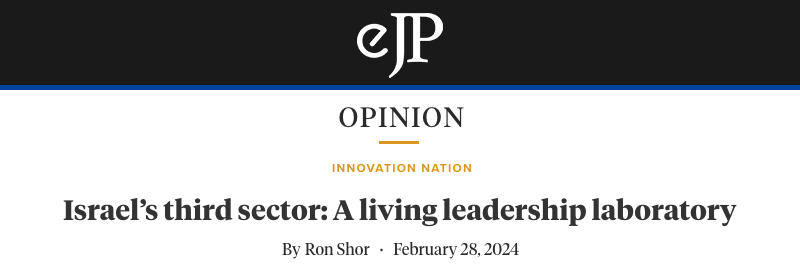
Ron Shor is the academic head of the nonprofit management and leadership masters program at the Rothberg International School of The Hebrew University of Jerusalem.

With nearly 40,000 registered nonprofit organizations, Israel boasts one of the world’s largest “third sectors,” as the nonprofit sector is commonly referred to here. For the past few years, the sector has consistently accounted for around 5% of the nation’s GDP, employing more than half a million people and providing 370,000 volunteer roles. It addresses a range of societal issues, spanning religion, education, health, social welfare, culture, environmental protection, housing, philanthropy and beyond.
On Oct. 7, not one but two distinct Israeli forces simultaneously mobilized. With the same urgency as the IDF call-up, Israeli civilians stepped up as if undertaking their own reserve duty. An army of individuals and organizations, volunteers and professionals, began responding to the newly emerging challenges the war caused for civilian life.

For the past 130+ days, Israel’s nonprofit sector — already robust prior to Oct. 7 — has galvanized in a show of incredible resilience, innovation and efficiency, demonstrating yet another side of the Start-Up Nation. This astounding and lightning-fast response not only addressed pressing challenges but introduced a host of new initiatives. As a professor of nonprofit management who teaches entrepreneurship and social innovation, I was particularly impressed by the sector’s ability to pivot and adapt to address various needs in the early weeks of the war.
Take, for example, Eran’s Angels, an organization that has been distributing food and other goods to the Holocaust survivors and families in need since 2014. After Oct. 7, the organization used its extensive network to coordinate the swift collection of vital necessities for displaced Israelis from southern and northern communities. Thousands of volunteers from Israel and worldwide have rallied to donate, organize and distribute supplies. Operating out of an underground parking garage in Tel Aviv, Eran’s Angels has emerged as a prominent grassroots aid agency in Israel.
After the onset of the war, the EMA Care initiative, a case management and medical concierge service, transitioned into Hinenu, a nonprofit organization focused on coordinating the medical personnel from around the world seeking to reach the institutions in Israel where their help was most needed. Working in partnership with the Health Ministry, Hinenu facilitates the credentialing and placement process for doctors, nurses and hospital staff seeking to volunteer.
Operating at the intersection of technology and health, Michal Lebenthal Andreson is the co-founder of impact.51, a “start-up studio” that helps build scalable, equitable and patient-centric solutions for complex problems related to women’s health. After Oct. 7, Lebenthal Andreson and her team quickly decided to shift focus and have the studio tackle the new needs of Israeli society, such as trauma, PTSD and stress-triggered diseases. They recently launched their second cohort, Mission Resilience, in response to these challenges.
And on the agricultural front, HaShomer HaChadash not only addressed critical supply chain issues by mobilizing volunteers to help farmers harvest and plant crops; online civilian networks were repurposed or established to coordinate assistance in everything from housing to procuring medical supplies, providing free mental health support and securing critical life-saving equipment.
Demonstrating rapid responses that highlight exceptional management practices, any of these examples could serve as a valuable case study for social impact organizations worldwide.
It is that innovation and practical application of taking academic research out of the lab and into the real world that is the focus of The Hebrew University of Jerusalem’s Nonprofit Management and Leadership Program. By living in Jerusalem at this exact moment, our students are seeing up-close the inner workings of civil society. Moreover, the program’s significant emphasis on collaboration with industry practitioners adds immense value to their learning experience. In a regular year, they witness how the city’s residents and Israelis nationwide participate in everything from urban planning to community building and leadership development; now, they find themselves in a living laboratory, observing firsthand how a sector under immense stress has stepped up to meet the challenges of the moment.
In the early weeks of the war, Israeli nonprofits prioritized urgent and time-sensitive tasks. Now, four months on, we are better able to appreciate the effort and expertise that fueled our success. The war affirmed what we’ve long understood: The problem-solving spirit of the Start-Up Nation permeates every sector of our society. These are invaluable lessons that will undoubtedly shape our program.
Both in the lecture halls and in the real world, our sector has not only risen to the occasion but has shaped this historic moment, with remarkable results. Even for those unable to come to Israel, the actions of our third sector will be studied as heroic, setting a new benchmark for sector leadership.
And for those who can, I invite social entrepreneurs eager to contribute to real-world solutions to join us in Jerusalem.